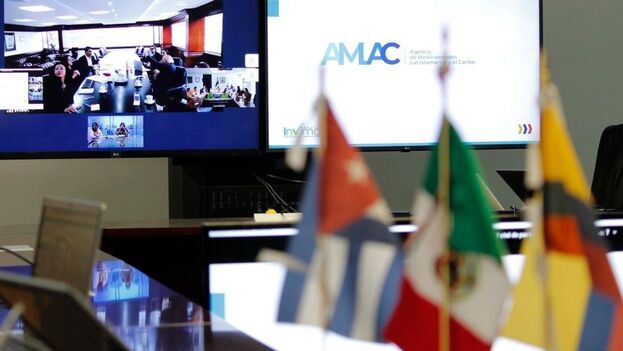
![]() 14ymedio, Madrid, 17 March 2023 — Mexico, Colombia and Cuba announced the creation of a Medication Agency of Latin America and the Caribbean (AMLAC), with which they plan to emulate the European Medication Agency (EMA). The initiative aims to “consolidate the self-sufficiency of strategic inputs in the region” and strengthen the authorization of drugs and vaccines during health emergencies through common regulatory frameworks.
14ymedio, Madrid, 17 March 2023 — Mexico, Colombia and Cuba announced the creation of a Medication Agency of Latin America and the Caribbean (AMLAC), with which they plan to emulate the European Medication Agency (EMA). The initiative aims to “consolidate the self-sufficiency of strategic inputs in the region” and strengthen the authorization of drugs and vaccines during health emergencies through common regulatory frameworks.
The project had been proposed in January of this year by Mexico during the Summit of the Community of Latin American and Caribbean States (CELAC), and although at that meeting many countries expressed their desire to join — Bolivia, Dominica, Ecuador, El Salvador, Honduras, Jamaica and the Dominican Republic — yesterday’s virtual meeting including only the Cuban, Colombian and Mexican health authorities, who announced the initiative.
The meeting was attended by directors of the National Institute of Drug and Food Surveillance (IMVIMA) of Colombia, the Center for the State Control of Medicines, Equipment and Medical Devices of Cuba (CECMED); and the Federal Commission for Protection against Health Risks (COFEPRIS) of Mexico, in addition to the foreign ministries of the three countries, according to a statement by the Mexican Secretary of Health.
The new organization, they added, also seeks to encourage and facilitate research and development of innovative projects. In this way, an attempt will be made to cover “the technological and organizational capacity gap for the development of raw materials, pharmaceuticals and health technologies to better respond to public health needs.”
In the absence of specifics, yesterday’s information points to a cooperation mechanism that would allow Cuba to have the resources that its economy — in critical condition — and the embargo complicate, and to obtain them through other countries that don’t have those impediments. In addition, regional regulation would facilitate the sale of drugs and vaccines to the Island.
In the same way as the EMA, all countries would maintain their own regulatory agency, but AMLAC would be responsible for centralizing the evaluation of medicines that, once they are are approved, could be marketed in all member countries without waiting for the approval of each and every one of the national regulators.
In addition, the approval of the World Health Organization (WHO) would not be a prerequisite for commercialization, as has happened with Cuban vaccines against COVID-19, which Havana has sold to several countries without the endorsement of the international regulator. The approval of several national regulators has allowed the Island to place its preparations, with the case of Mexico at the forefront. COFEPRIS gave the green light in December 2021 to Abdala, the Cuban vaccine, and bought at least nine million doses. However, a year later, Mexico had barely used 262,540 doses, less than 3%.
This integration process takes place at the beginning of the anti-inflation summit, also devised by Andrés Manuel López Obrador, which was planned for Friday but yesterday was confirmed for April 5. The virtual meeting was revealed by Argentine President Alberto Fernández — who is recovering from a herniated disc operation this Wednesday — on February 26 to the press, and it was planned that Brazil and Colombia — the other two large economies of the region — would unite together with Cuba to create a product exchange mechanism in order to contain inflation.
Finally, the meeting will be online and the guests are multiplying, according to López Obrador speaking this Thursday in his daily conference. In addition to those already mentioned, there will be the presidents of Bolivia, Chile and Honduras, as well as the prime ministers of Belize, Johnny Briceño, and of Saint Vincent and the Grenadines, Ralph Gonsalves.
Those present have the mission of “advancing the agreement,” said the Mexican, who responded that the list of countries “is going to be expanded little by little” when asked about some absentees, such as Peru.
López Obrador insisted that the objective is “to achieve good prices for the domestic markets of the countries, through the reduction of tariffs and other trade barriers,” and that the price of food plays a very important role in the second meeting. In addition, he stated that the Development Bank of Latin America (CAF) will provide “technical assistance” to the participating countries.
Christian Asinelli, corporate vice president of Strategic Programming of the entity, confirmed it on Twitter, where he said that the CAF “will continue to strengthen cooperation and financing to the countries of the region, in order to address inflation and its impacts.”
Pending more details on how they intend to coordinate the mechanism, the disparity in the economies of the member countries will be one of the main burdens, as well as debt, very different inflation rates and almost no trade exchange between the different countries.
Translated by Regina Anavy
____________
COLLABORATE WITH OUR WORK: The 14ymedio team is committed to practicing serious journalism that reflects Cuba’s reality in all its depth. Thank you for joining us on this long journey. We invite you to continue supporting us by becoming a member of 14ymedio now. Together we can continue transforming journalism in Cuba.
